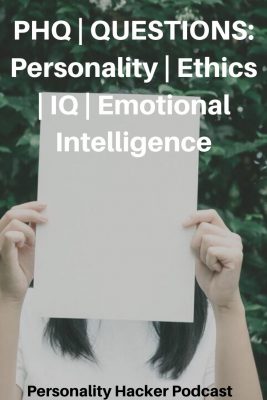Download Episode Here – right click link and select “Save Link As…”
PHQ | QUESTIONS FROM COMMUNITY: In this episode Joel and Antonia answer a question about personality types – ethics – IQ – and Emotional Intelligence.
To subscribe to the podcast, please use the links below:
Subscribe with iTunes
Non iTunes Link
Download The Android App
Subscribe on Soundcloud
Subscribe with Stitcher
If you like the podcast and want to help us out in return, please leave an honest rating and review on iTunes by clicking here. It will help the show and its ranking in iTunes immensely! We would be eternally grateful!
Want to learn more?
Discover Your Personal Genius
We want to hear from you. Leave your comments below…



Share:
PHQ | QUESTIONS: How To Get Into Action As An INFJ
PHQ | QUESTIONS: Intuitive Parents and Sensor Children
29 comments
Thanks for humouring me and reading them.
Oh I love the 19th century too. I like your idea! Applied to one age before, Enlightenment ideas (Ti) preceded and pushed revolutionary humanitarian (Fe) ideas forward. The industrial revolution (Te) as you said, served as the tension which sprung the age of skepticism at the latter half of the century.
We talk about the Graves model applied on micro (individual) and macro (civilization). I think my idea makes a distinction between 3 levels— micro (individual), macro (civilization)—, and, hm, supermacro? (species). Graves model 1 as a species is yes, caveman. Graves model 1 as an individual is birth/baby. and Gravels model as a civilization is also “birth”. Civilizations, like people, are born, rise, mature, and die out, at least thus far in history, civilizations and empires rise and fall. Each time new civilizations get further and further, built upon their predecessors, just like individual generations.
And I will stop there, as Fermi pointed out, this has gone way off topic. But thanks you both for listening nonetheless, much appreciated.
The podcast on Tribal Leadership deals a bit with this subject.
(http://www.personalityhacker.com/podcast-episode-0069-tribal-leadership/)
The vast majority of people believe, “I’m awesome. Everyone else sucks.” It’s actually a scale up from the belief that “I suck.” Ideally, we want to get to the point where we realize everyone has their strengths and all personalities are necessary for the the smooth functioning of society.
Trust me, with my Ti tertiary I am constantly having to fight the belief that I’m smarter than everyone else. ;)
Fascinating! I know Antonia has broken down the Graves levels on a much more expansive basis (Graves 1 being the caveman era; Graves 2 being the tribal level which immediately followed the caveman; Graves 3 being Genghis Khan era; etc).
But society does not go through all levels at the same time, of course. We still see Graves 2 scattered around the world even now. So the concept that there can be a resurgence of different Graves levels as they pull against other is an interesting concept.
I really like how you characterized the 19th century. I have studied that era quite a lot, from a religious perspective, and I have read a lot of the poetry from the time.
I have heard it also referred to as the Age of Skepticism and, believe it or not, it was the era from which much of the apocalyptic religions were born. It seems to me that as society began to look toward the Industrial Age as their salvation (Te), the moralistically inclined (Fi?) resisted. You will find a lot of poetry about the death of God during this time. And religion became more reactionary. Armageddon threats became more prominent and the idea of the Last Days gained its foothold.
I can definitely see that as a potential pulling between Te/Fi.
Very interesting! Thanks for sharing your insights!!
As an Ni user, I see the reasons for morals since I can see and understand people’s motivations and cultural paradigms. But I am rather judgmental of people who use morals alone. I find morals limiting, to a certain extent. Ni has the ability to “see” into the future based upon the observations it makes, so I have a tendency to see the world as being limited by a moralistic perspective (kinda like the past ;) ).
That may be me misunderstanding and judging morality harshly because of a strict religious paradigm I was brought up in. Again, we have the dichotomy of nature vs nurture. :/
What MBTI type are you, I am just curious.